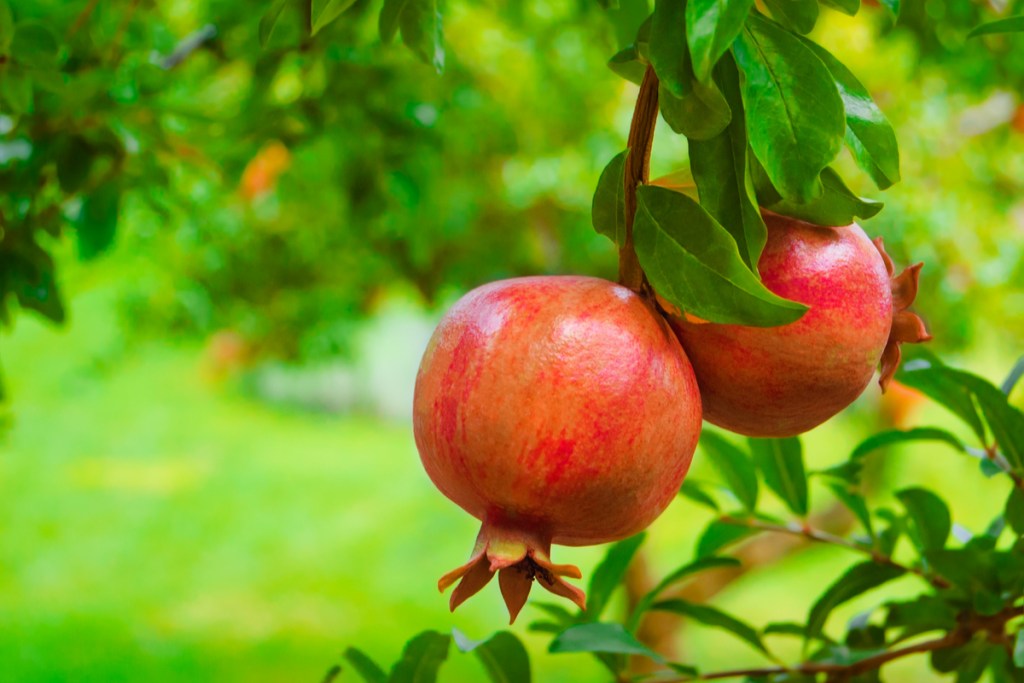If you’re a fan of pomegranates, then you know they can be expensive and a challenge to eat, but you also know they are well worth it for the treat. The best way to spend less money on pomegranates is to grow them yourself. However, unless you have a long history of working in pomegranate orchards, you may not know what nutrients pomegranate trees need.
Can you make everything they need in the comfort of your own home, or should you outsource and get fertilizer from a professional? We’ve got the answers you need. Read on to learn what the best fertilizer for pomegranate trees is and more details on fertilizing your pomegranate trees.
What are pomegranates?
Before we talk about what the trees need, let’s briefly explain what pomegranates are. Pomegranate trees (Punica granatum) are hardy tropic to subtropic plants or shrubs that can tolerate hot and dry conditions. These trees produce reddish-brown fruits that have smooth and hard exteriors. The interior of the fruit is the edible part and consists of white, pulpy mesocarp surrounding small seeds that are sweet and full of antioxidants known to have several health benefits.
What do pomegranate trees need?
Like all flowering and fruiting trees, pomegranates need a lot of nitrogen and enjoy acidic soil. Nitrogen helps plants grow and develop, and can improve the quantity and quality of fruit. A balanced fertilizer that contains nitrogen provides your pomegranate trees with everything they need to grow.
However, if your soil is already rich in nitrogen, then adding more may do more harm than good. You can get a soil testing kit to see how much nitrogen you have naturally available. Your local agricultural department and some landscaping companies offer this as a service, but you can also find it online.
You can use either homemade compost or store-bought fertilizer for pomegranate trees. Depending on your soil quality and environment, you may see better success with one over the other or with a mix of the two. If you choose to make your own, add plenty of scraps from leafy greens and any coffee grounds you have. For store-bought fertilizer, look for balanced 8-8-8 or 10-10-10 fertilizers.

How often should you apply fertilizer?
During the first year after planting, your trees are growing and establishing themselves. They don’t need any extra fertilizer during this time besides a layer of mulch or compost. During this year of rapid growth, your plants’ needs change rapidly and it is easy to add too much of any given nutrient, which can lead to stunted growth.
During the second year, you’re free to add a small amount of fertilizer. Add 1 or 2 ounces in the spring and fall. Every year after the second, increase the amount of fertilizer by another ounce, up to year five.
For many trees, no fertilizer is necessary at all. While it can be tempting to add things to the soil that could benefit your plants, this can lead to overloading the soil. It’s important to consider if your plants actually need the boost or not. If your trees are looking sickly, not growing as expected, or if a soil test shows your soil is lacking, then fertilizer is a great option for you.
What is the best store-bought pomegranate tree fertilizer?
Purely Organic Tomato and Vegetable Plant Food 8-8-8 is a great, balanced fertilizer. Don’t be fooled by the name, it isn’t just for tomatoes and vegetables — your pomegranate trees can benefit from it as well.
One important thing to clarify is that, although the brand name is Purely Organic, this product isn’t certified organic. The fertilizer contains added dicalcium phosphate and potassium chloride. Neither chemical is harsh, and both have some natural sources. Dicalcium phosphate can be produced from bones, and potassium chloride is found in many rocks and minerals. Since they are chemical additives, though, this fertilizer is technically not organic.
You’re prepared for all the fertilizer needs of your pomegranate trees now. If your soil is lacking, or your trees are stunted or growing too slowly, then a healthy dose of fertilizer may be just what your pomegranate trees need to be the fruit-bearing plant you expect them to be. Some nitrogen-rich fertilizer or compost added in small amounts twice a year can help your pomegranate trees thrive. Just be careful not to overdo it!



